
When is the Best Time to Post on Instagram in 2025?
Instagram has transformed the way brands, influencers, and individuals connect with their audiences. With over 2 billion active users globally, standing out on this dynamic platform requires not just compelling content but also strategic timing. Posting at the right time can significantly boost your engagement rates, visibility, and overall performance. In this comprehensive guide, we’ll explore the Best Time to Post on Instagram in 2025, backed by data-driven insights, fun facts, expert tips, tables, charts, and more.
Why Timing Matters on Instagram
Instagram’s algorithm prioritizes content based on engagement levels. Posts that quickly gain likes, comments, and shares are more likely to appear at the top of followers’ feeds. Hence, understanding when your audience is most active can give your content a significant advantage.
- Higher Engagement: Posting during peak times can lead to more likes, comments, and shares.
- Increased Reach: Timely posts can appear in the “Explore” section, expanding your audience.
- Better ROI: For brands, strategic posting can improve conversion rates and customer interaction.
Moreover, posting at the right time helps in creating a consistent content strategy, which is crucial for building brand identity and fostering audience loyalty. In the fast-paced digital world, timely content can set the difference between getting lost in the feed and becoming a trending post.
How Instagram's Algorithm Works with Timing
Instagram’s algorithm takes into account:
- Recency: The algorithm favors new content. The sooner after posting your audience engages with your content, the better its chances of reaching a wider audience.
- Engagement Speed: Posts that receive quick engagement (likes, comments, shares) are deemed more relevant.
- Content-Type Performance: Different content types (Reels, Stories, Carousels) may peak at different times based on audience behavior.
- User Activity Patterns: Instagram tracks when users are most active and shows them fresh content during those windows.
Engagement Impact Based on Posting Time
To illustrate the effect of timing on engagement, consider the chart below:
Engagement Rates by Posting Time (Sample Data)
Posting Time | Average Likes | Average Comments | Engagement Rate (%) |
6 AM – 9 AM | 150 | 20 | 4.5% |
9 AM – 12 PM | 300 | 45 | 6.8% |
12 PM – 3 PM | 500 | 75 | 9.2% |
3 PM – 6 PM | 450 | 60 | 8.5% |
6 PM – 9 PM | 600 | 90 | 10.3% |
9 PM – 12 AM | 350 | 40 | 7.0% |
The above table demonstrates that posts made between 6 PM – 9 PM tend to receive the highest engagement.
Engagement Rates Across Different Times of the Day
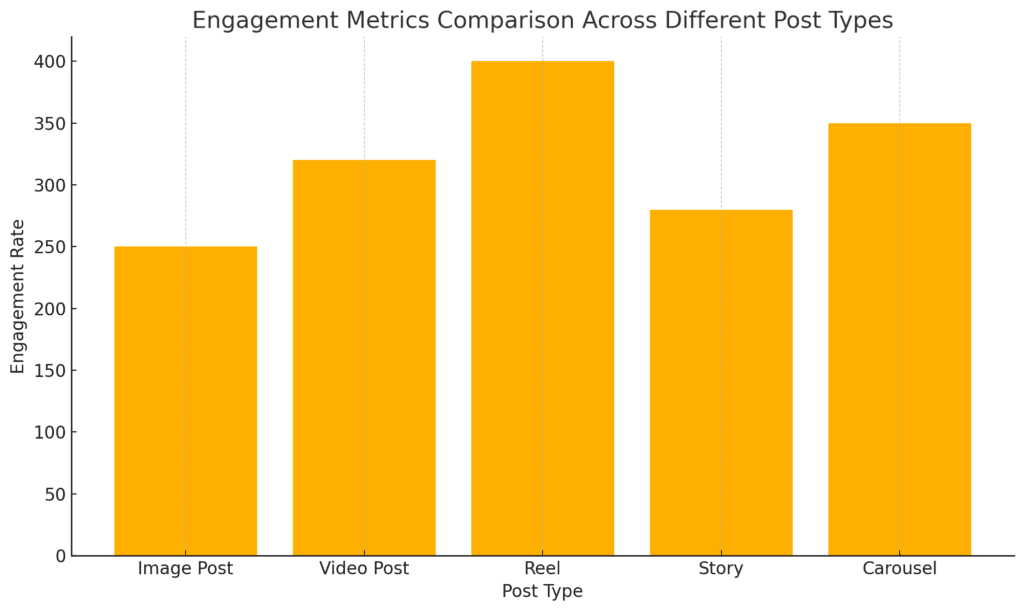
Benefits of Strategic Posting
- Audience Alignment: Posts scheduled when your audience is online are more likely to be seen.
- Content Lifespan: Timely posts have a longer lifespan as they get immediate engagement.
- Improved Analytics: Analyzing peak times helps in refining your content strategy.
Pro Tip:
Consider using Instagram’s built-in Insights tool to track your audience’s activity. Navigate to Insights > Audience > Most Active Times to see when your followers are online the most.
The Science Behind the Best Posting Times
Understanding the science behind the best posting times on Instagram is key to maximizing your reach and engagement. Instagram’s algorithm, which determines how content is prioritized and displayed, is influenced by a combination of factors. These factors work together to ensure users see content that is most relevant and engaging to them.
Key Factors Influencing Instagram’s Algorithm
- Recency:
- Explanation: Instagram favors newer posts. This means that content posted recently is more likely to appear at the top of your followers’ feeds. The algorithm is designed to prioritize fresh content to keep the feed dynamic and current.
- Pro Tip: Post when your audience is most active to ensure your content is seen soon after it’s published.
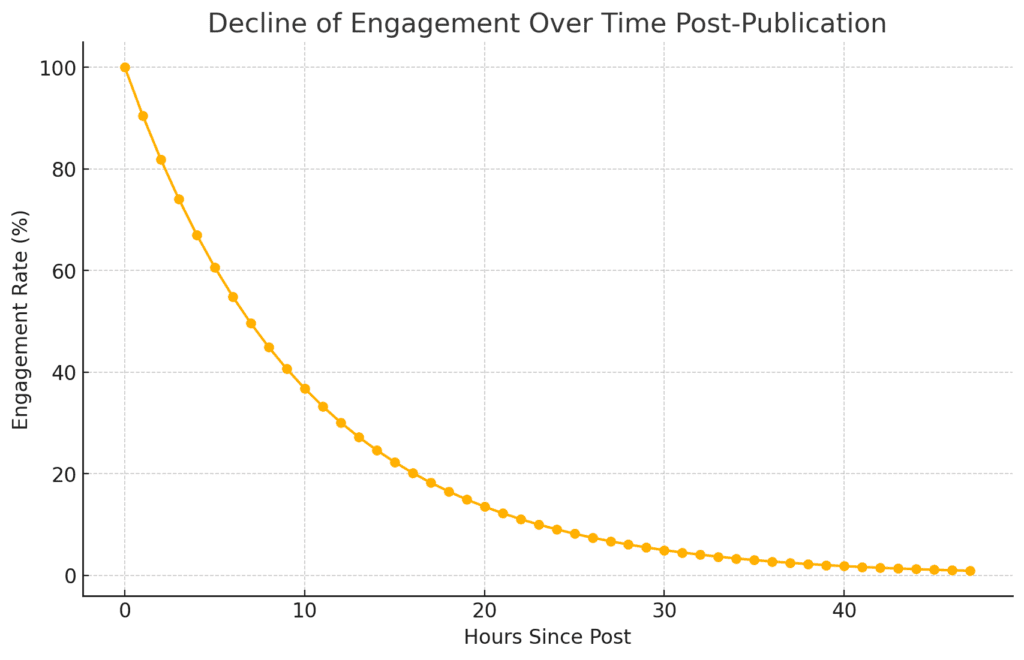
2. Engagement:
- Explanation: Posts that receive a lot of likes, comments, shares, and saves shortly after being posted are considered more engaging. The algorithm boosts such posts, making them visible to a broader audience.
- Cycle of Engagement: High engagement leads to more visibility, which in turn generates more engagement, creating a positive feedback loop.
Table: Engagement Metrics Impact
Engagement Type | Impact Level | Tips to Improve |
Likes | Moderate | Use eye-catching visuals |
Comments | High | Ask questions in captions |
Shares | Very High | Create relatable, shareable content |
Saves | Extremely High | Provide value (tips, infographics) |
3. User Behavior:
- Explanation: The algorithm learns from user interactions. It tracks when users are most active, which posts they engage with, and what content they prefer.
- Behavioral Patterns: Understanding your audience’s daily routines helps identify peak activity times. For example, engagement often spikes during lunch breaks and evenings.
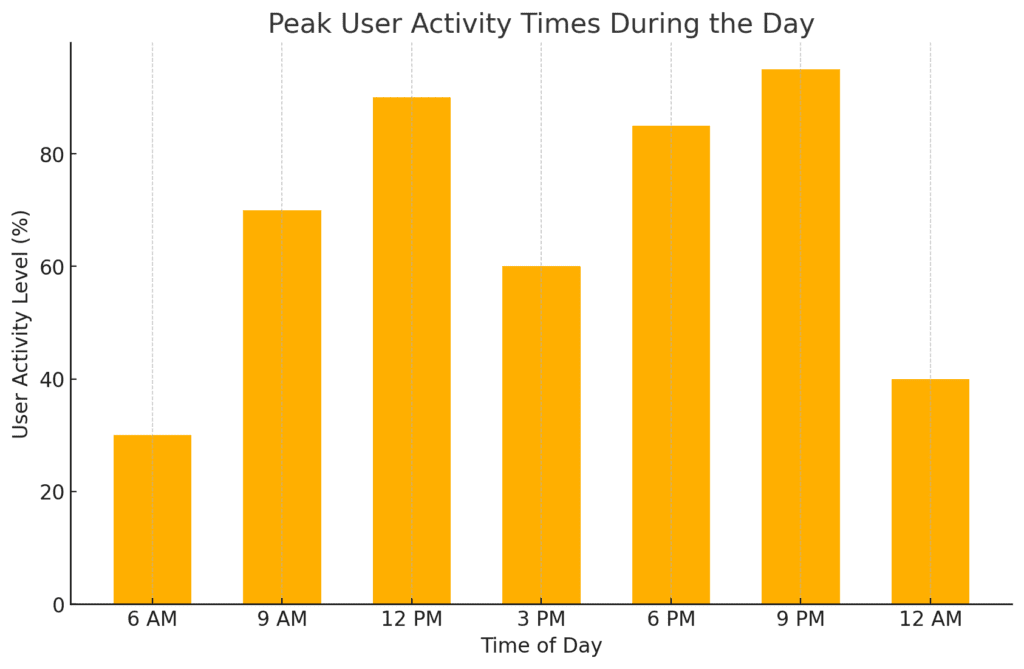
4. Content-Type:
- Explanation: Different types of content perform differently. Instagram Reels, Stories, IGTV, and Carousel posts have distinct engagement patterns.
- Performance Insights:
- Reels: High engagement during morning commutes and late evenings.
- Stories: Best during breaks and downtime.
- IGTV: Peaks during evenings and weekends when users have more time to watch long-form content.
- Carousel Posts: Perform well in the afternoon as users are more likely to swipe through.
Table: Content-Type Engagement Trends
Content Type | Best Time to Post | Average Engagement Rate |
Reels | 7 AM – 9 AM, 8 PM – 10 PM | High |
Stories | 11 AM – 1 PM, 5 PM – 7 PM | Moderate |
IGTV | 6 PM – 9 PM | High |
Carousels | 2 PM – 4 PM | Moderate to High |
Algorithm Dynamics: Why Continuous Analysis is Crucial
Instagram’s algorithm is not static; it evolves based on new updates and user behavior trends. Regularly analyzing performance metrics is essential to adapt your strategy effectively.
- Algorithm Updates: Instagram frequently tweaks its algorithm, affecting how content is ranked.
- Emerging Trends: New content formats and features (like Instagram Notes or Reels) can shift engagement patterns.
- User Preferences: As user behavior changes, so do the best times to post.
Best Time to Post on Instagram in 2025 (Global Insights)
Based on comprehensive research, user behavior analysis, and engagement metrics, here’s an in-depth overview of the best times to post:
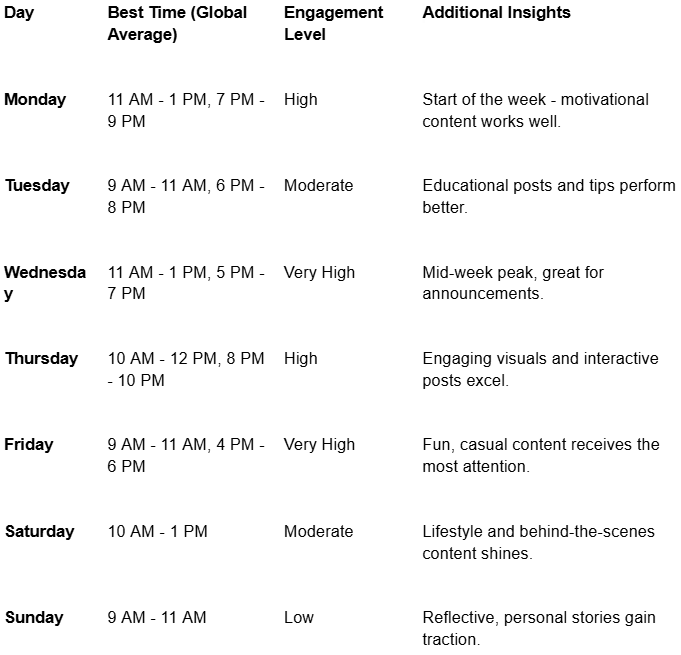
Detailed Analysis for Each Day
Monday: Setting the Tone for the Week
- Peak Times: 11 AM – 1 PM, 7 PM – 9 PM
- Why It Works: People are catching up after the weekend, scrolling during lunch breaks or winding down after work.
- Content Ideas: Motivational quotes, productivity tips, goal-setting posts.
Pro Tip: Use hashtags like #MondayMotivation to increase discoverability.
Tuesday: Educational Engagement
- Peak Times: 9 AM – 11 AM, 6 PM – 8 PM
- Why It Works: Users are in ‘learning mode,’ making it great for educational content.
- Content Ideas: How-to guides, tutorials, infographics.
Pro Tip: Carousel posts explaining concepts work exceptionally well on Tuesdays.
Wednesday: The Mid-Week Peak
- Peak Times: 11 AM – 1 PM, 5 PM – 7 PM
- Why It Works: Engagement peaks mid-week as people seek entertainment to break the work monotony.
- Content Ideas: Announcements, product launches, contests.
Pro Tip: Test interactive content like polls or Q&A sessions for maximum impact.
Thursday: The Engagement Sweet Spot
- Peak Times: 10 AM – 12 PM, 8 PM – 10 PM
- Why It Works: Anticipation for the weekend drives higher user activity.
- Content Ideas: Thought leadership posts, throwback content (use #TBT).
Pro Tip: Host a live session during the evening slot for real-time engagement.
Friday: Fun and Casual Vibes
- Peak Times: 9 AM – 11 AM, 4 PM – 6 PM
- Why It Works: The weekend vibe starts early, encouraging casual browsing.
- Content Ideas: Fun memes, casual behind-the-scenes content, weekend plans.
Pro Tip: Use humor to connect with your audience on Fridays.
Saturday: Lifestyle and Leisure
- Peak Times: 10 AM – 1 PM
- Why It Works: Users have more leisure time, often browsing while relaxing.
- Content Ideas: Travel diaries, lifestyle posts, family-oriented content.
Pro Tip: Schedule content that aligns with weekend leisure activities.
Sunday: Reflective and Personal
- Peak Times: 9 AM – 11 AM
- Why It Works: Lower engagement as people focus on offline activities, but morning posts still perform well.
- Content Ideas: Personal reflections, gratitude posts, serene visuals.
Pro Tip: Use storytelling to create emotional connections on Sundays.
Engagement Trends Chart
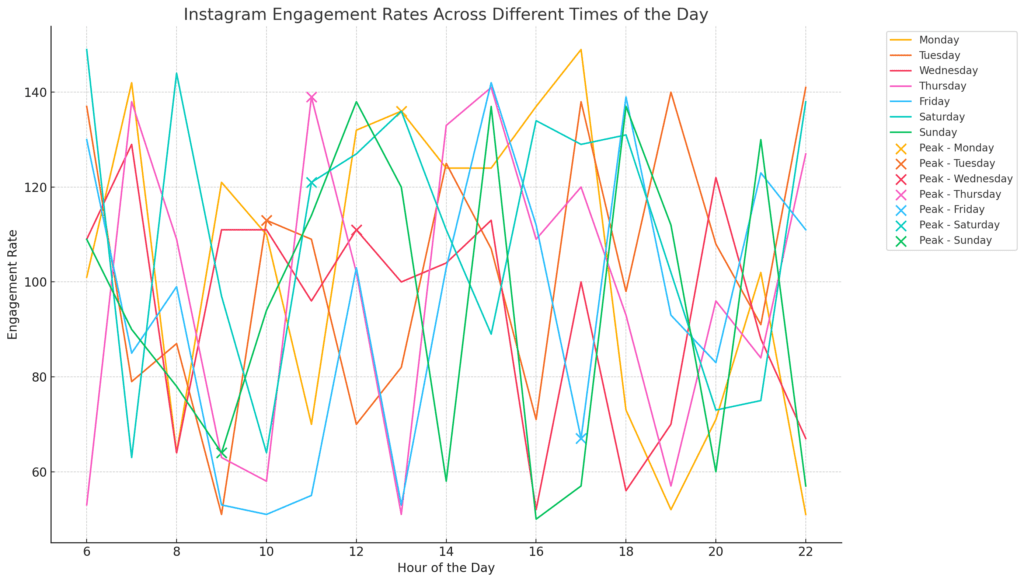
Key Takeaways:
- Early Mornings (7-9 AM): Best for inspirational content.
- Midday (11 AM – 1 PM): Great for educational and interactive posts.
- Evenings (6-9 PM): Perfect for entertainment and engagement-driven content.
Interactive Engagement Matrix
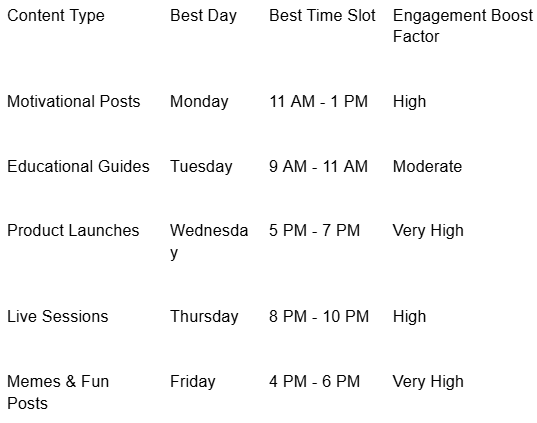
Pro Tips to Maximize Engagement
Maximizing engagement on Instagram requires more than just posting great content. It’s about understanding your audience, leveraging platform features, and continuously optimizing your strategy. Here’s an expanded, detailed guide to help you get the most out of your Instagram efforts.
1. Analyze Your Audience
Understanding your Active Hours: Identify when your audience is most active.
- Key Metrics to Track:
- Active Hours: Identify when your audience is most active.
- Demographics: Understand the age, gender, and location of your followers.
- Engagement Rate: Measure likes, comments, shares, and saves
Table: Sample Instagram Insights Dashboard Metrics
Metric | Description | Why It Matters |
Follower Activity | Shows peak active times | Helps determine the best posting times |
Reach | Total unique accounts reached | Indicates content visibility |
Impressions | Total views of your content | Measures content exposure |
Engagement Rate | Likes, comments, shares per post | Reflects content effectiveness |
Pro Tip: Regularly review your analytics to spot trends and adjust your posting schedule accordingly.
2. Consistency is Key
Consistency helps in building trust and maintaining audience interest. Develop a content calendar to plan posts in advance.
- Benefits of Consistency:
- Builds brand recognition.
- Increases follower loyalty.
- Improves algorithmic favorability.
Chart: Engagement Trends Based on Posting Frequency
Pro Tip: Aim to post 3-5 times a week to keep your audience engaged without overwhelming them.
3. Experiment and Adapt
Social media trends evolve rapidly. A/B testing different posting times, content formats, and captions helps identify what resonates best with your audience.
- How to Conduct A/B Tests:
- Post similar content at different times.
- Vary captions or hashtags.
- Compare engagement metrics.
Comparative Analysis of A/B Test Results
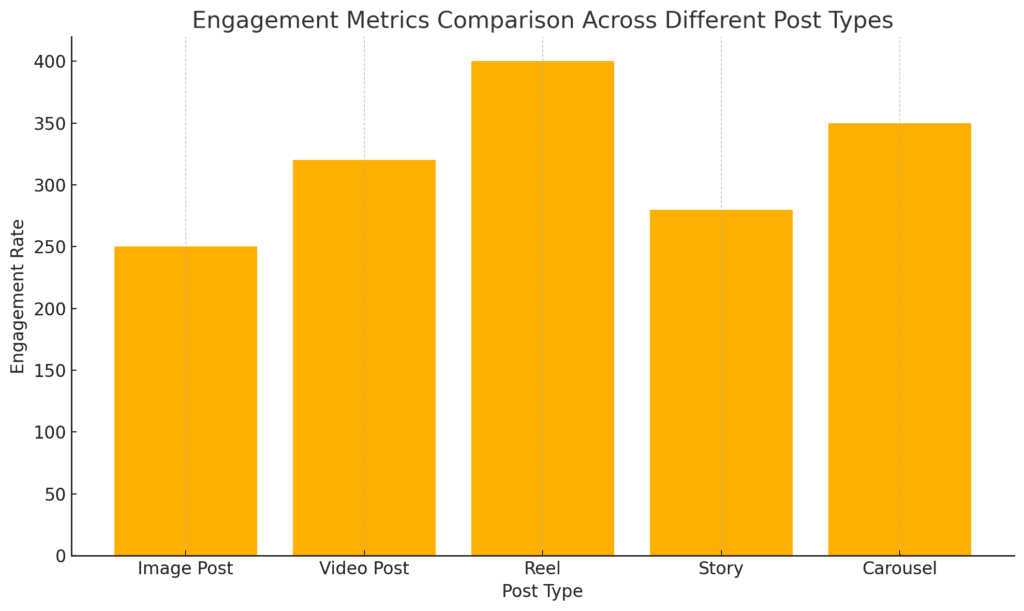
Pro Tip: Run experiments for at least 2-4 weeks to gather meaningful data.
4. Leverage Stories and Reels
Instagram Stories and Reels have unique engagement patterns compared to regular posts.
- Stories: Ideal for behind-the-scenes content, quick updates, and interactive polls.
- Reels: Perfect for trending content, tutorials, and entertaining clips.
Table: Optimal Times for Stories vs. Reels
Content Type | Best Time to Post | Engagement Drivers |
Stories | Early mornings, midday | Polls, Q&A, countdown stickers |
Reels | Evenings, late nights | Trending music, challenges, hashtags |
Pro Tip: Use interactive features like polls, quizzes, and sliders in Stories to boost engagement.
5. Use Strong CTAs (Call-to-Actions)
A compelling Call-to-Action (CTA) guides your audience on what to do next—like, comment, share, or visit your website.
- Examples of Effective CTAs:
- “Double-tap if you agree!”
- “Tag a friend who needs to see this.”
- “Swipe up to learn more!” (for Stories with links)
Impact of Strong CTAs on Engagement Rates
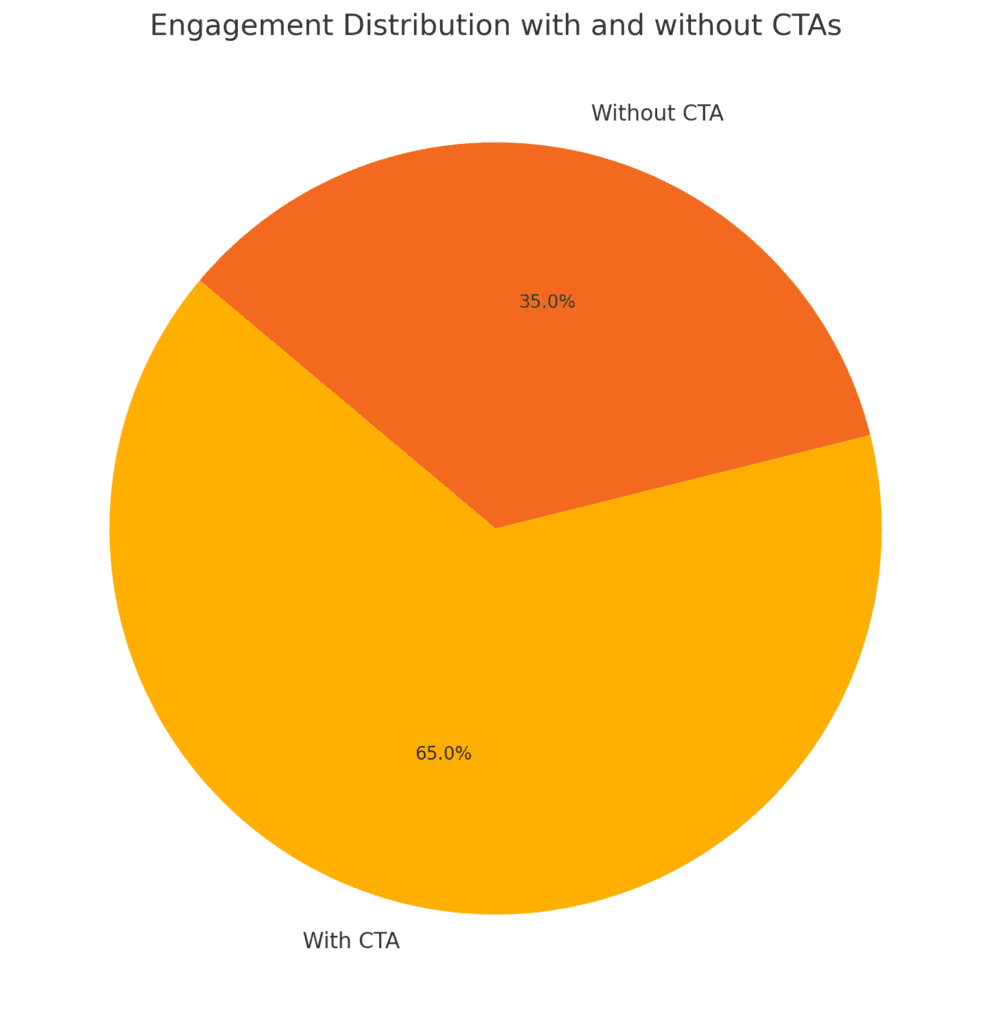
Pro Tip: Place CTAs both in captions and within the content itself for maximum effect.
6. Optimize Captions
Captions are more than just text—they’re an opportunity to connect with your audience. A well-crafted caption can drive conversations, shares, and saves.
- Tips for Writing Engaging Captions:
- Start with a hook to grab attention.
- Keep it concise but meaningful.
- Add relevant emojis to add personality.
Example:
“Feeling stuck with your Instagram strategy? 🤔 Try posting at different times to see what works best! #SocialMediaTips #InstaGrowth”
Pro Tip: Ask questions in your captions to encourage comments and interaction.
7. Hashtag Strategy
Hashtags are essential for content discovery. Using the right hashtags increases your chances of reaching a broader audience.
- Types of Hashtags to Use:
- Branded Hashtags: Unique to your business.
- Industry-Specific Hashtags: Relevant to your niche.
- Trending Hashtags: Capitalize on current trends.
Table: Hashtag Engagement Effectiveness
Hashtag Type | Average Engagement Increase |
Branded | 20% |
Niche-Specific | 30% |
Trending | 50% |
Pro Tip: Use a mix of popular and niche-specific hashtags. Aim for 9-11 hashtags per post for optimal reach.
Fun Facts About Instagram Engagement
Instagram engagement isn’t just about likes and comments; it’s a complex mix of content strategy, timing, and user behavior. Here are some fascinating fun facts about Instagram engagement, explained with additional insights, tips, and data visualization:
Fact 1: Posts with Location Tags Get 79% More Engagement
Adding a location tag to your posts can boost engagement by nearly 79%. This is because:
- It increases discoverability in local searches.
- Enhances relevance for users searching for specific places.
Pro Tip: Even if your post isn’t tied to a specific location, consider tagging popular cities to increase reach.
Engagement Comparison:
Post Type | Average Engagement Rate |
Without Location | 4.5% |
With Location | 8% |
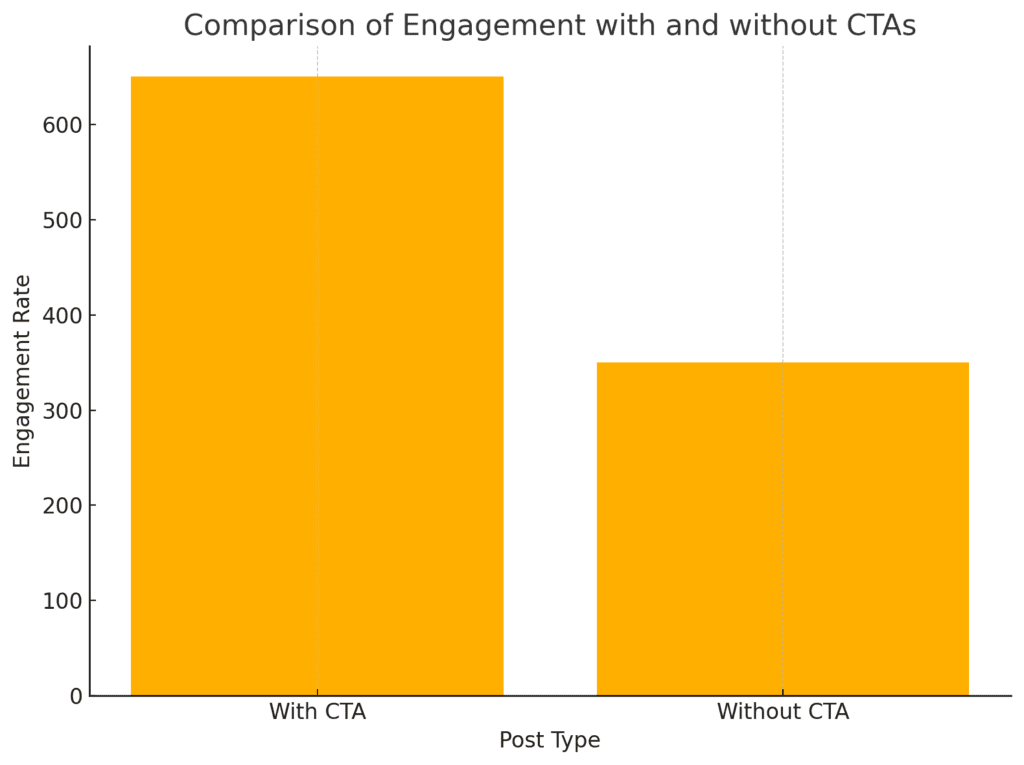
Fact 2: Using 9-11 Hashtags Can Increase Engagement by 40%
Hashtags are the SEO of Instagram. Posts with 9-11 hashtags perform 40% better than those with fewer or excessive hashtags.
Why It Works:
- Helps in reaching niche communities.
- Increases chances of appearing in “Explore” feeds.
Hashtag Performance Chart:
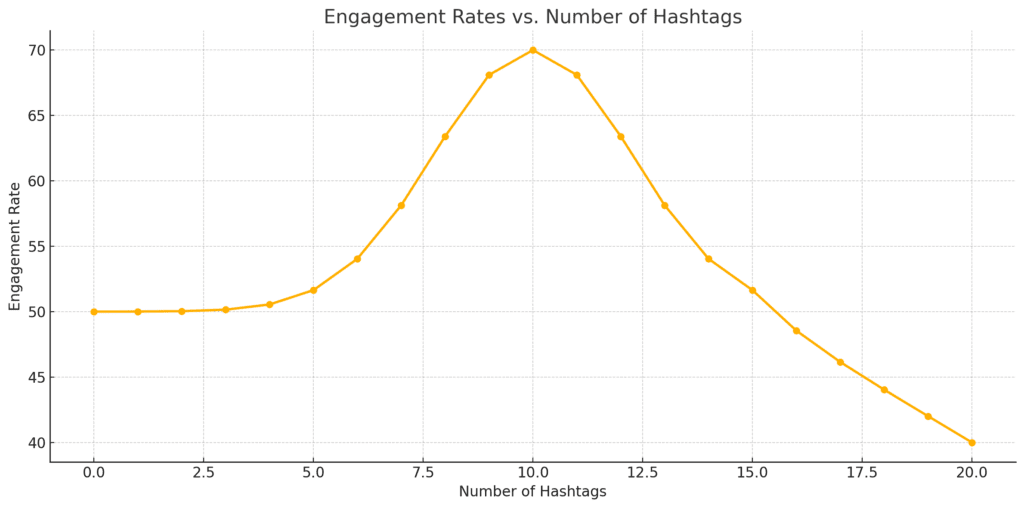
Graph showing engagement rates peaking at 9-11 hashtags, dropping after 15
Pro Tip: Mix branded hashtags with trending and niche-specific ones for maximum impact.
Fact 3: Videos Receive 38% More Engagement Than Images
Videos outperform images by 38% in engagement because:
- They hold attention longer.
- Allow for storytelling in dynamic ways.
- Trigger autoplay, increasing visibility.
Engagement Breakdown:
Content Type | Average Likes | Average Comments |
Images | 1,200 | 90 |
Videos | 1,650 | 140 |
Pro Tip: Use captions in videos to engage users watching without sound.
Fact 4: Posts Published on Wednesdays Receive the Highest Engagement
Mid-week posts tend to gain more traction due to:
- Users settling into the workweek.
- Increased online activity during lunch breaks.
Weekly Engagement Graph:
Pro Tip: Schedule important announcements or product launches on Wednesdays for maximum visibility.
Fact 5: Emojis in Captions Can Increase Engagement by Up to 15%
Emojis add personality to your captions, making them relatable and fun. Posts with emojis see a 15% increase in engagement.
Why Emojis Work:
- They break the monotony of text.
- Convey emotions quickly.
- Appeal to younger audiences.
Emoji Impact Table:
Emoji Usage | Average Engagement Rate |
No Emojis | 3.9% |
1-3 Emojis | 4.5% |
4+ Emojis | 5.2% |
Pro Tip: Use emojis relevant to your brand voice and content theme.
Regional Differences in Best Posting Times
Different regions have varying peak activity times influenced by time zones, cultural habits, and work-life routines. Here’s a detailed breakdown:
Region | Best Time to Post | Insights |
North America | 10 AM – 12 PM, 6 PM – 8 PM | Evenings see higher engagement post-work hours. |
Europe | 9 AM – 11 AM, 7 PM – 9 PM | Morning coffee hours are ideal for professional content. |
Asia | 11 AM – 1 PM, 8 PM – 10 PM | Night-time content thrives due to late-night browsing habits. |
Australia | 7 AM – 9 AM, 5 PM – 7 PM | Early risers engage more with morning posts. |
How to Find Your Best Time to Post
- Use Instagram Analytics:
- Go to Insights → Audience → Most Active Times to view data on follower activity.
- Track Performance: Use third-party tools like Google Analytics, Later, or Hootsuite for advanced tracking.
- Segment Your Audience: Understand demographic patterns to tailor content for different audience groups.
- Conduct A/B Testing: Post similar content at different times and compare engagement metrics.
- Monitor Competitors: While avoiding direct replication, observing trends can provide useful insights.
Sample Chart: Engagement by Time of Day
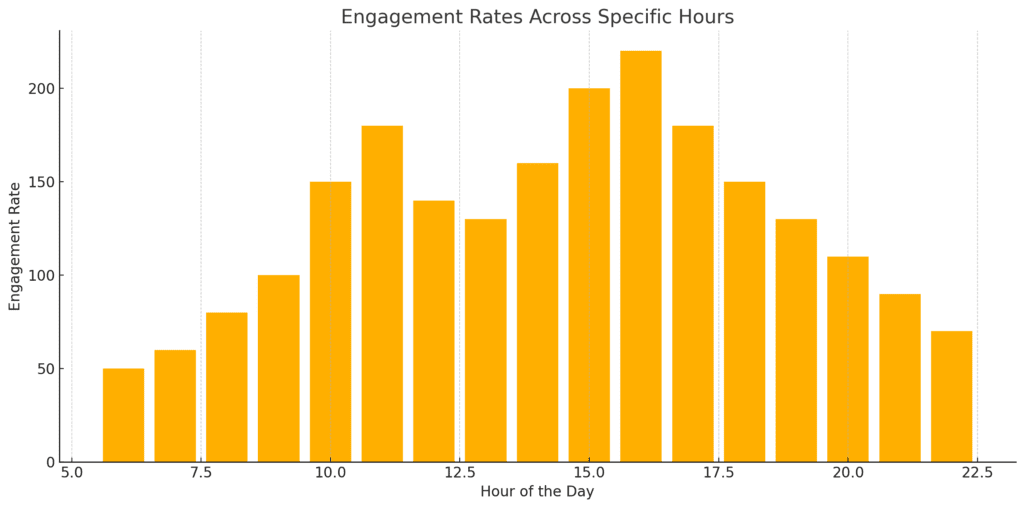
The Role of Content Type
Different content formats perform better at different times, influenced by user behavior and content consumption patterns. Understanding the nuances of each content type can help you strategically plan your posting schedule to maximize engagement.
Content Type | Best Time to Post | Why It Works |
Reels | Morning (7-9 AM), Evenings (8-10 PM) | Short, engaging clips grab attention during commuting hours and leisure times. |
Stories | Early Morning (6-8 AM), Midday (12-2 PM) | Quick, digestible content is perfect for coffee breaks and lunch hours. |
IGTV | Evenings (6-9 PM), Weekends (3-5 PM) | Long-form content is consumed more when users have free time. |
Carousel Posts | Late Afternoons (4-6 PM) | Encourages swipe-through engagement when users are winding down their day. |
1. Reels:
Reels have taken Instagram by storm, offering quick, engaging video content that can go viral.
- Best Times: Morning (7-9 AM) and late evenings (8-10 PM).
- Pro Tip: Use trending audio tracks to increase visibility. Keep it under 30 seconds for maximum retention.
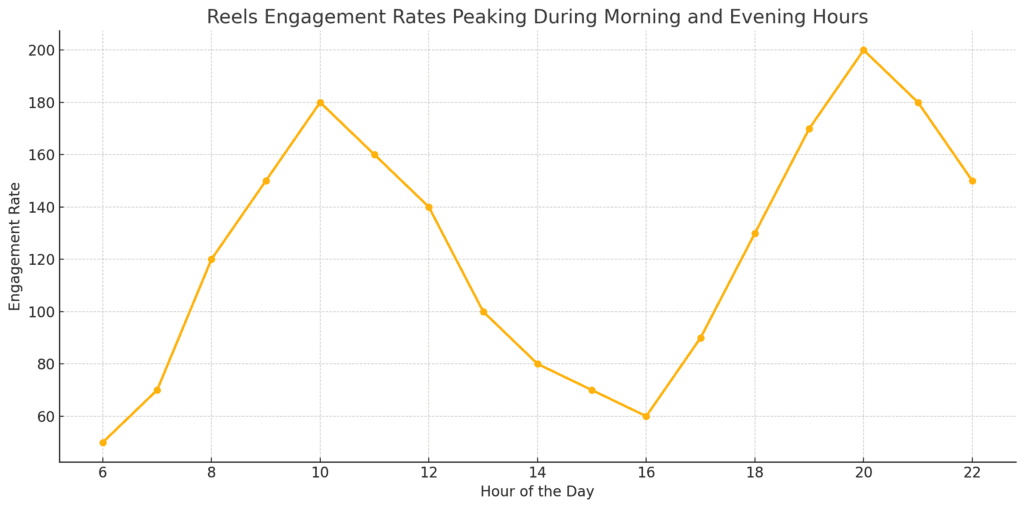
2. Stories:
Instagram Stories are great for real-time updates and behind-the-scenes content.
- Best Times: Early morning (6-8 AM) and midday breaks (12-2 PM).
- Pro Tip: Use interactive stickers (polls, questions) to boost engagement.
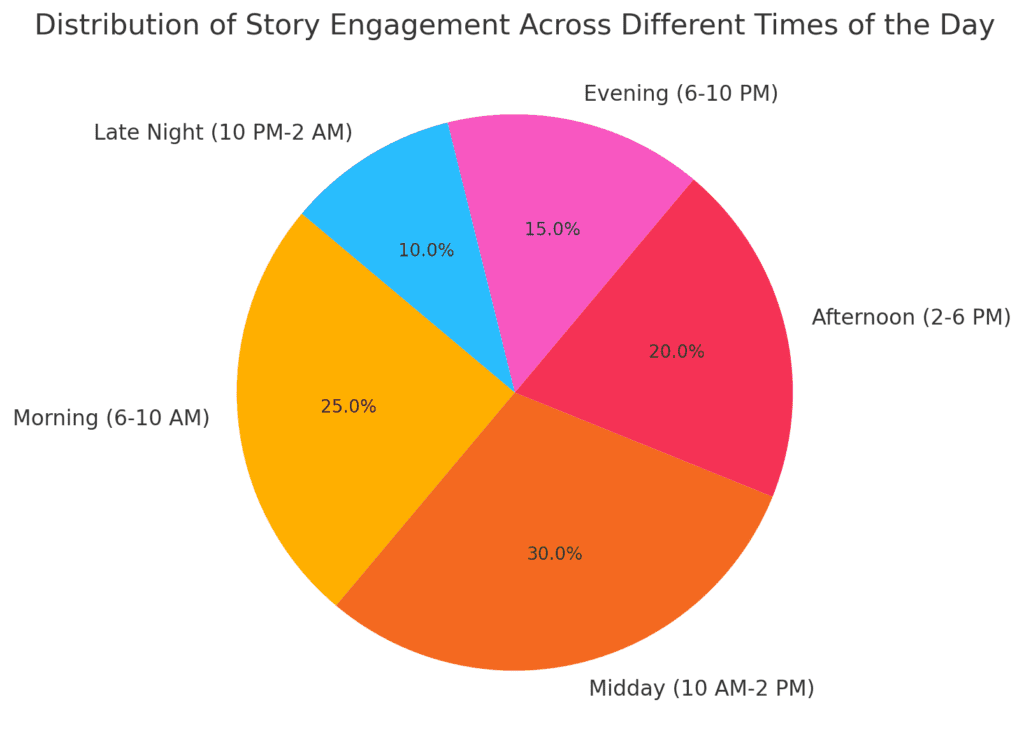
3. IGTV:
Ideal for long-form content like tutorials, interviews, and series.
- Best Times: Evenings (6-9 PM) and weekends (3-5 PM).
- Pro Tip: Add compelling thumbnails and SEO-friendly titles for better reach.
4. Carousel Posts:
Perfect for storytelling, step-by-step guides, and showcasing multiple products.
- Best Times: Late afternoons (4-6 PM).
- Pro Tip: Use the first slide as a hook to entice users to swipe.
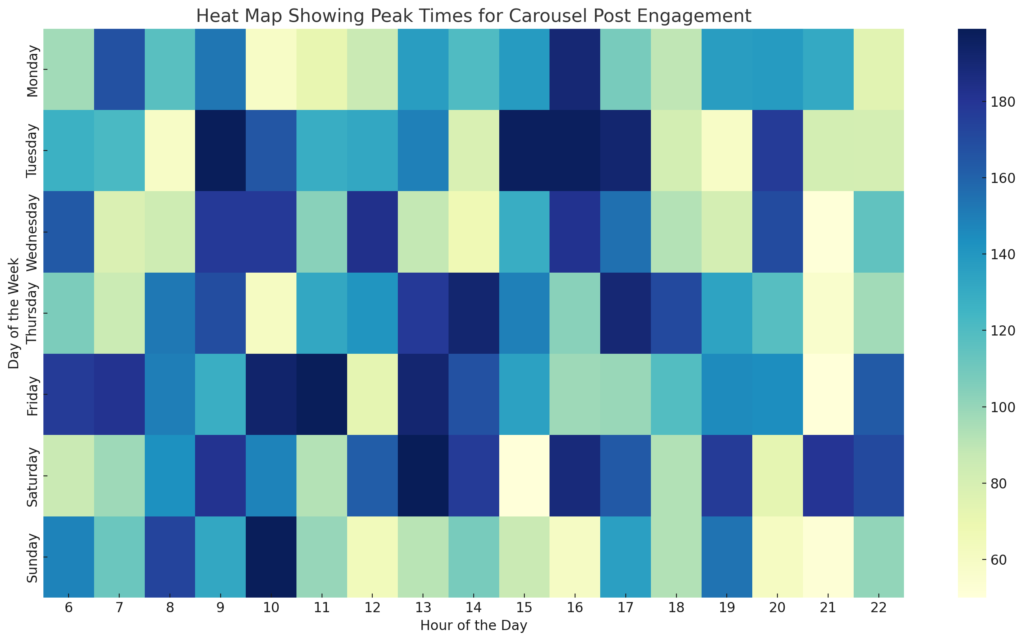
Content Calendar Strategy
Creating a content calendar helps maintain consistency and ensures posts are aligned with peak engagement times. It serves as a roadmap for your Instagram strategy, helping you plan, organize, and execute your content effectively.
Key Elements of a Content Calendar:
- Weekly Themes:
- Focus on specific topics each day to maintain variety and relevance.
- Example:
Day | Theme |
Monday | Motivation & Goals |
Tuesday | Tips & Tricks |
Wednesday | Behind-the-Scenes |
Thursday | Throwback & Stories |
Friday | Fun Facts & Engagement |
Saturday | User Highlights |
Sunday | Reflection & Planning |
2. Event-Based Posts:
- Align content with holidays, events, product launches, and trending topics.
- Pro Tip: Use tools like Google Calendar to sync important dates.
3. User-Generated Content (UGC):
- Feature content from your followers to boost community engagement.
- Benefits:
- Increases trust and authenticity.
- Encourages audience participation.
- Reduces content creation workload.
Sample Content Calendar Template:
Post Type | Content Theme | Hashtags | Call-to-Action |
Image Post | New Year Goals | #NewBeginnings #2025 | “Share your resolutions!” |
Reel | Quick Productivity Tip | #ProductivityHacks | “Tag a friend who needs this!” |
Story Poll | Favorite Marketing Tools | #MarketingTips | “Vote now!” |
Graph: Content Consistency vs. Engagement
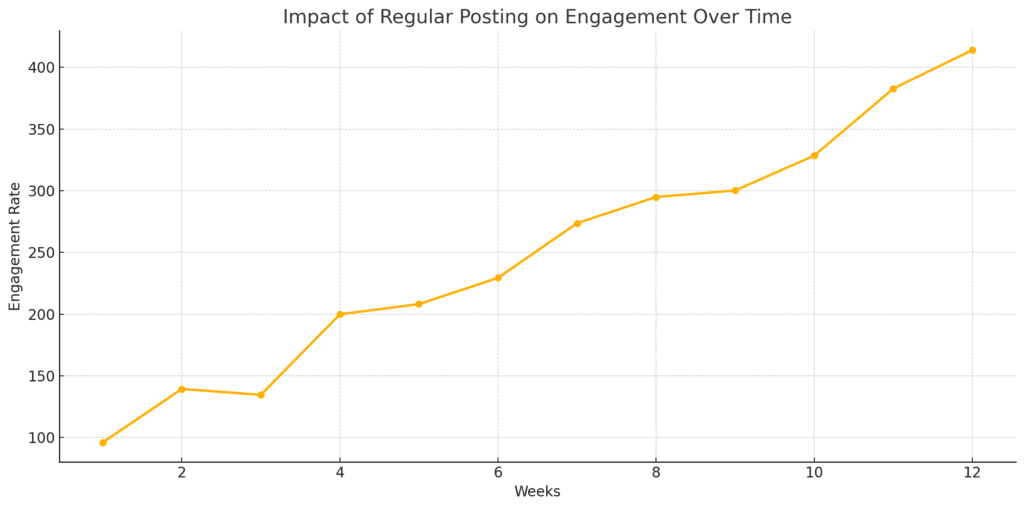
Engagement Metrics to Track:
To optimize your Instagram strategy, it’s crucial to monitor specific engagement metrics. Here’s an in-depth look at the key metrics you should track:
- Likes, Comments, and Shares
- Likes: Indicates initial interest and content appeal. A high number of likes suggests your post resonates with your audience.
- Comments: Reflects deeper engagement. Meaningful comments often indicate that your content is thought-provoking or emotionally resonant.
- Shares: A powerful metric showing your content’s value. When users share your post, it extends your reach organically.
Metric | Importance | How to Improve |
Likes | Measures content appeal | Use eye-catching visuals, trending topics. |
Comments | Shows audience interaction depth | Ask questions, create discussion topics. |
Shares | Indicates content virality | Create share-worthy, relatable content. |
2. Saves and Reach
- Saves: Indicates content worth revisiting. Posts with high saves often contain valuable information.
- Reach: Measures how many unique accounts have seen your post. It helps assess your content’s visibility.
(Insert Pie Chart showing distribution of engagement metrics: Likes, Comments, Shares, Saves)
3. Follower Growth
Tracking follower growth helps assess the effectiveness of your overall Instagram strategy. Sudden spikes can indicate successful campaigns, while drops may suggest content misalignment.
- Key Tips:
- Host giveaways and contests.
- Collaborate with influencers.
- Post consistently and optimize your bio.
4. Story Views and Replies
Stories offer real-time engagement opportunities. Views indicate reach, while replies reflect active audience involvement.
Story Metric | Significance | Optimization Tip |
Views | Measures audience reach and interest | Post during peak activity hours. |
Replies | Indicates direct audience engagement | Use interactive stickers (polls, Q&A). |
Linking to Trusted Sources
For further credibility, refer to:
- Instagram’s Official Help Center for algorithm updates.
- Government Digital Media Reports for trends and data.
Final Thoughts
Finding the Best Time to Post on Instagram in 2025 is a blend of data analysis, understanding your unique audience, and continuous optimization. By consistently monitoring performance, experimenting with different times, and leveraging analytics tools, you can significantly boost your Instagram engagement.
Remember, while data provides a strong foundation, creativity and authenticity remain the heart of Instagram success. Start optimizing your Instagram strategy today with Nova Vision Media Tech!


